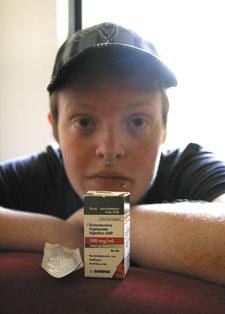When Ryan Jarman decided to start hormone therapy as a trans man in 2004, he was turned down by no less than 17 doctors.
“They all told me no because they didn’t have the experience,” he says. “I offered them information, but they all just weren’t interested.”
When he finally found a physician willing to accept him as a patient, Jarman was put on 200 mg of testosterone every two weeks. When he later moved to Vancouver, his new doctor at the Three Bridges Clinic, one of two clinics in Vancouver that treat transsexuals, cut his dose in half and told him trans people are usually started on no more than 35–50 mg of testosterone.
“I had severe acne. It was under my skin. I was getting muscle spasms. It was really painful,” Jarman recalls. “Too high of a dose can be very dangerous.”
Getting access to competent hormone treatment can be a challenge, says Marria Townsend, a physician at Three Bridges.
Three Bridges employs three physicians trained in trans health issues. But the clinic’s narrow catchment area means Townsend can’t accept patients who live outside the West End or downtown.
“There are a lot of people looking for treatment, and they are unable to find it,” says Townsend.
Robena Sirett, manager of Vancouver Coastal Health’s Transgender Health Project, thinks the lack of trained physicians can present a health risk for trans people. The Health Project offers training workshops and co-created clinical guidelines for prescribing and monitoring hormones. But the guidelines are not mandatory for BC health services.
“I have to guess that very few doctors are even aware of their existence,” says Townsend.
Billy Taylor found it “extremely hard” to find a competent physician to start his hormone therapy. He opted to temporarily move to the Three Bridges’ catchment area in order to get treatment. He has been on testosterone for two months.
Though he’s happy to see his body finally begin to change, he is also worried about the hormone’s potential long-term effects.
“I was just reading the little pamphlet that came with [my testosterone] and it says in huge letters at the very bottom, ‘Women should never take this product.’ It’s like ‘well… okay.’”
One of the risks for trans men that remains largely unexplored is the effect testosterone may have on their fertility. Taylor says he is concerned about his reproductive organs. He has also been warned by his doctor about the long-term effects of hormone therapy, such as diabetes, heart problems, breast or ovarian cancer — effects that are “rare but real” according to Townsend.
Gail Knudson, past-president of the Canadian Professional Association for Transgender Health, thinks more research on trans people and hormones needs to be done.
“There are no funds specifically targeted to transgender health,” Knudson says. “Also, fellowships for training in transgender health are very, very limited.”
Townsend says she sometimes has to be vague when educating her patients about the long-term effects, due to the lack of studies conducted on significant numbers over a longer period of time.
Until more research is done, trans people who want to transition using hormones might have to expose themselves to health risks that haven’t yet been discovered.
Despite the potential known and unknown risks, neither Taylor nor Jarman hesitated.
“I’d rather die younger knowing that I stayed true to myself, instead of being absolutely miserable in my body and keep saying to myself ‘What if?’” says Jarman. “Whatever long-term health effects that may have, so be it.”

 Why you can trust Xtra
Why you can trust Xtra


